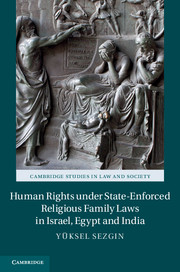Human Rights under State-Enforced Religious Family Laws in Israel, Egypt and India

Human Rights under State-Enforced Religious Family Laws in Israel, Egypt and India
Yüksel Sezgin
Cambridge University Press, Cambridge Studies in Law and Society 2013
About one-third of the world’s population currently lives under pluri-legal systems where governments hold individuals subject to the purview of ethno-religious rather than national norms in respect to family law. How does the state-enforcement of these religious family laws impact fundamental rights and liberties? What resistance strategies do people employ in order to overcome the disabilities and limitations these religious laws impose upon their rights? Based on archival research, court observations and interviews with individuals from three countries, Yüksel Sezgin shows that governments have often intervened in order to impress a particular image of subjectivity upon a society, while people have constantly challenged the interpretive monopoly of courts and state-sanctioned religious institutions, re-negotiated their rights and duties under the law, and changed the system from within. He also identifies key lessons and best practices for the integration of universal human rights principles into religious legal systems.
- De-orientalizes shari’a law by placing it in a comparative perspective along with Jewish, Christian and Hindu religious laws
- Uses non-technical language in providing overviews of the legal and political histories of the nations covered, while still providing detailed analysis
- Alongside the discussion of the theoretical and normative implications of state-enforced religious laws on human rights, the author also identifies how Israeli, Egypt and Indian activists have successfully protected and advanced human and women’s rights in the past
Contents
1. Introduction
2. Personal status, nation-building, and the postcolonial state
3. The impact of state-enforced personal status laws on human rights
4. A fragmented confessional system: state-enforced religious family laws and human rights in Israel
5. A unified confessional system: state-enforced religious family laws and human rights in Egypt
6. A unified semi-confessional system: state-enforced religious family laws and human rights in India
7. Conclusion: upholding human rights under religious legal systems.
Yüksel Sezgin is an Assistant Professor of Political Science at Maxwell School of Citizenship and Public Affairs, Syracuse University, where his research and teaching interests include legal pluralism, informal justice systems, comparative religious law, and human and women’s rights in the context of the Middle East, South Asia and Sub-Saharan Africa.